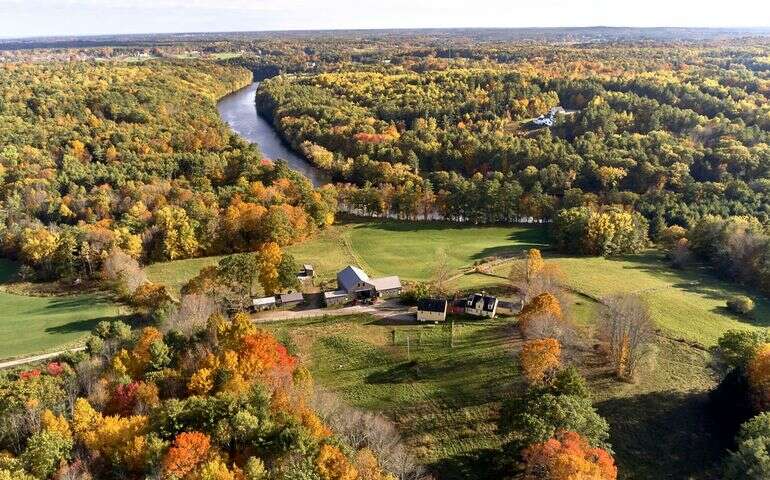
Ecology School campus hits 90% of fundraising goal; construction halfway complete
 COURTESY / ECOLOGY SCHOOL
The Ecology School in Saco received a contribution $500,000 from Poland Spring to go toward construction of an education and dining commons.
COURTESY / ECOLOGY SCHOOL
The Ecology School in Saco received a contribution $500,000 from Poland Spring to go toward construction of an education and dining commons.
An environmental school in Saco has reached 90% of its fundraising goal of $14 million to build a new campus and has launched the public phase of its capital campaign.
The Ecology School is an environmental education nonprofit. It received a major contribution of $500,000 toward its goal from Poland Spring to go toward construction of an education and dining commons, it said.
“We are deeply grateful for our supporters in Maine and across the country,” Drew Dumsch, the school’s president, CEO and founder, said in a news release. “Now, more than ever, we need to reset the future of people and the planet.”
“At Poland Spring, we are proud to continue supporting Mainers, in this case by helping the Ecology School make environmental education possible today and tomorrow,” Tara Carraro, executive vice president and chief corporate affairs office with Nestlé Waters North America, owner of Poland Spring, said in the release. “The Ecology School is actively responding to our changing planet and increasing awareness of steps we can all take to help create a healthier, more sustainable future. We are honored to take this education one step further with the Poland Spring Education and Dining Commons on the Ecology School’s campus.”.
Since 2001, Poland Spring has provided more than $1 million of support to the school. This translates to more than 15,000 students receiving 178,000 hours of science instruction, including water quality testing and learning about the importance of recycling and healthy eating.

Other supporters from Maine and across the nation include the Daniel E. Offutt III Charitable Trust, Jane’s Trust and Quimby Family Foundation.
Over halfway complete
Construction is more than halfway complete. The goal is to be the most sustainable building in the Northeast.
In addition to the commons, the campus will include a 9,000-square-foot dormitory. Together, the buildings will use more than 200,000 board feet of local Maine Forest Stewardship Council certified lumber.
To support the Ecology School’s goal of producing 105% net positive energy, the buildings will contain 718 solar panels. Doors are expected to open this November.
The school provides residential ecology education for people of all ages to learn by their natural inclinations, engaging in all five senses to discover the inner workings of the world around them. Through hands-on, experiential programming, people at the school learn to become stewards of the environment as they explore Maine’s food systems and local ecosystems.

Since 1998, the school has hosted more than 187,000 students and teachers from across the country, educating them about nature, connecting them to the environment, and teaching them about our impact on the planet. In 2020-21, the school plans to teach more than 10,000 program participants of all ages.
In 2019, the school was awarded a $8,660,000 loan from the USDA Rural Development’s Community Facilities Direct Loan and Guaranteed Loans program to build its new campus. It was the largest community facilities loan granted to an educational facility in Maine within the past decade. In addition, CEI is providing $1.75 million in long-term financing.
The Ecology School is seeking $1.2 million in the public phase of its capital campaign to complete its goal. To make a contribution, click here.
Last December, Dumsch told Mainebiz that the construction standard are designed to meet standards set by the Living Building Challenge, a program of the Seattle-based International Living Future Institute whose goal is to create buildings that generate more energy than they use, capture and treat all water on site, and are made using healthy materials.










0 Comments